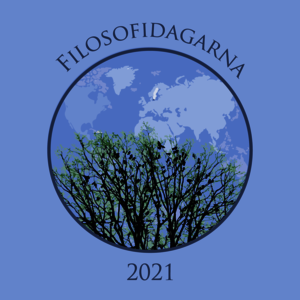FILOSOFIDAGARNA 2022
The 2021 Swedish Congress of Philosophy
Lund, Sweden June 10th - June 12th, 2022
About the Conference
Filosofidagarna is a biennial philosophy conference that circulates between universities in Sweden. The 2022 conference is arranged by Lund University’s Department of Philosophy between 10-12 June. The conference venue is the LUX building at Helgonavägen 3, which houses the Joint Faculties of Humanities and Theology. It is expected that some 100 researchers will present work from all areas of philosophy.We welcome submissions in Swedish and English, and we welcome submissions both for individual talks and for small workshops. Submissions for individual talks should include (a) name, (b) affiliation, (c) title of the talk, (d) an abstract of up to 300 words, and (e) a preferred section. Individual talks will be allocated 40 minutes, including discussion, and will provisionally be organised around the following categories: Aesthetics, Applied ethics, Decision theory, Epistemology, Ethics, History of philosophy, Logic and philosophy of mathematics, Metaethics, Metaphysics, Phenomenology, Philosophy of AI, Philosophy of language, Philosophy of law, Philosophy of mind, Philosophy of religion, Philosophy of science, Political philosophy, Value theory.
Submissions for individual talks should be submitted via Easychair:https://easychair.org/conferences/?conf=fildagar21 We invite submissions for workshops in all areas of philosophy. Workshops will be allocated 160 minutes. They should feature 4-5 talks and allow time for discussion with the audience. Workshop organisers are responsible for the scheduling within the workshop, and for appointing chairs. Submissions must include (a) names and affiliations of the organisers and speakers, (b) title of the workshop, (c) an abstract for the workshop of up to 300 words, and (d) titles and abstract the embedded talks (up to 150 words each).
Workshop submissions should be emailed to:robert.palfil.luse The deadline for submission is February 28. We expect to notify authors and workshop organisers about their submissions by March 31. Information concerning how to apply to the conference, deadlines, and other practicalities will follow in due course. See also the Essay competition for advanced students (for more information, go to Essay Competition). Erik J. Olsson and Toni Rønnow-Rasmussen More information: Robert Pál-Wallin, +46709817095, email: robert.palfil.luse
We accept submissions in both Swedish and English!
Invited Speakers
The organizers of Filosofidagarna 2022 are happy to announce that Prof. Christian List (Ludwig Maximilians Universität, München) will give this year's Theoria Lecture.
Furthermore, a keynote lecture will be given by Prof. Hilary Greaves (Oxford University)
In addition, we have a long list of speakers who will give lectures organised around specific sections. The full list of speakers can be found here.
Workshops
Workshop on Social Responsibility
Date: June 10th
Time: 14.40-18.00
Workshop Description:
The aim of this workshop is to examine a fundamental aspect of moral responsibility through a variety of lenses. The fundamental aspect in question is that moral responsibility in general and our moral responsibility practices in particular are social phenomena. Most theories of moral responsibility focus on one-one cases of moral responsibility, say, one victim blaming one wrongdoer. Do these theories easily extrapolate to cases involving more than one blamer? What happens in cases where the collective, but not necessarily the individual is blameworthy and needs to ask for forgiveness. Our moral responsibility practices do not only focus on properties of the wrongdoer, but also of the blamer. What needs to be true for a blamer to have the proper standing to blame a wrongdoer appropriately? When do our social circumstances impede our agency, and our responsibility?
Workshop on Blame: Perspectives and Moral Expectations
Date: June 11th
Time: 9.15-15.50
Workshop Description:
In this workshop, we present new work on the ethics of blame. One issue that we take up is the challenge from free will skepticism that, due to determinism, it is unfair to hold anyone to moral expectations. However, abandoning our moral responsibility practices because they are unfair is also a moral expectation, and hence the argument is self-defeating. Nevertheless, it is arguably unfair to hold particular morally incapacitated agents to moral expectations. We investigate the complex and ambivalent responses we have towards morally incapacitated agents, such as psychopaths, and pay particular attention to the perspective of the victim, who may have reasons to blame these agents where third parties do not. Still, philosophizing about blame should not only focus on the victim’s perspective or that of an offended party. Considering the emotional reactions felt from the position of a non-affected third party is important to shed light on the complexities that our blaming practices involve and the conditions under which blaming emotions are fitting. Whether a blaming emotional response is fitting has mostly been framed in terms of what the blamed agent must be like for it to be fitting to blame him/her. However, the fittingness of emotions is arguably not only grounded in features of the wrongdoer but might depend on the particular cares and commitments of the prospective blamer.
Previous Conferences
Filosofidagarna 2019 at Umeå University www.umu.se/institutionen-for-ide-och-samhallsstudier/forskning/vara-amnen/filosofi/swedish-congress-of-philosophy-2019/
Filosofidagarna 2017 at Uppsala University www.filosofi.uu.se/filosofidagarna2017/
More
Contact
If you have any conference related questions you are more than welcome to contact Robert Pál-Wallin on the following email: robert.palfil.luse
Acknowledgements
The organizers of Filosofidagarna 2022 are grateful for generous financial support from Kungl Humanistiska Vetenskapssamfundet i Lund and Erik and Gurli Hultengren Fund for Philosophy at Lund University. Filosofidagarna 2022 is sponsored by Lunds Kommun (Lund Municipality).


